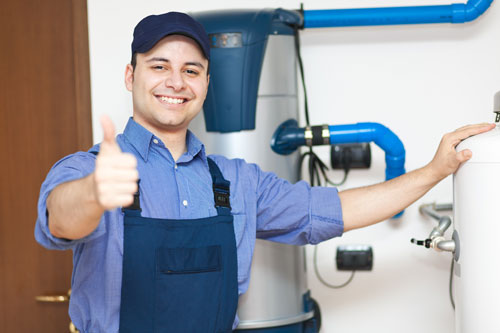Understanding Heater Challenges: A Step-By-Step Guide To Usual Standard Issues
Understanding Heater Challenges: A Step-By-Step Guide To Usual Standard Issues
Blog Article
Presented here below you can find a good deal of good guidance relating to Common Problems with Tank Water Heaters.

Envision starting your day without your regular hot shower. That currently sets a bad tone for the rest of your day.
Every house needs a dependable water heater, yet just a couple of recognize how to manage one. One very easy means to maintain your water heater in top form is to check for faults regularly as well as repair them as quickly as they appear.
Keep in mind to turn off your hot water heater before smelling around for mistakes. These are the hot water heater faults you are probably to run into.
Water too warm or also cold
Every water heater has a thermostat that figures out just how hot the water gets. If the water entering your residence is as well warm regardless of establishing a convenient maximum temperature level, your thermostat might be defective.
On the other hand, as well cold water may be because of a stopped working thermostat, a damaged circuit, or incorrect gas flow. For example, if you utilize a gas water heater with a broken pilot light, you would get cold water, even if the thermostat remains in best condition. For electrical heating units, a blown fuse may be the wrongdoer.
Not enough warm water
Hot water heater can be found in lots of sizes, relying on your hot water needs. If you run out of warm water before every person has had a bathroom, your water heater is as well small for your family size. You must consider setting up a bigger water heater storage tank or selecting a tankless water heater, which takes up less room and also is more long lasting.
Unusual noises
There go to the very least 5 type of sounds you can learn through a water heater, yet the most usual analysis is that it's time for the water heater to retire.
To start with, you ought to recognize with the typical seems a water heater makes. An electric heater might seem different from a gas-powered one.
Popping or banging audios generally suggest there is a piece of sediment in your containers, and also it's time to clean it out. On the other hand, whistling or hissing sounds may simply be your shutoffs allowing some pressure off.
Water leakages
Leaks could originate from pipes, water links, shutoffs, or in the worst-case situation, the storage tank itself. Over time, water will certainly rust the tank, as well as find its way out. If this takes place, you need to change your hot water heater as soon as possible.
Nonetheless, prior to your adjustment your entire storage tank, be sure that all pipes remain in location which each shutoff works completely. If you still require aid determining a leakage, call your plumber.
Rust-colored water
Rust-colored water suggests among your hot water heater components is corroded. It could be the anode rod, or the tank itself. Your plumber will be able to identify which it is.
Lukewarm water
Regardless of exactly how high you set the thermostat, you won't get any warm water out of a heater well past its prime. A water heater's efficiency might minimize with time.
You will also get warm water if your pipelines have a cross connection. This suggests that when you activate a tap, hot water from the heater moves in together with regular, cold water. A cross link is easy to spot. If your warm water faucets still pursue shutting the hot water heater valves, you have a cross connection.
Discoloured Water
Corrosion is a major root cause of filthy or discoloured water. Rust within the water container or a falling short anode pole can cause this discolouration. The anode rod safeguards the storage tank from rusting on the inside and need to be checked yearly. Without a pole or a correctly functioning anode pole, the warm water rapidly rusts inside the container. Call a specialist water heater specialist to establish if changing the anode pole will certainly deal with the problem; if not, replace your water heater.
Conclusion
Preferably, your hot water heater can last ten years before you need a change. However, after the 10-year mark, you might experience any one of these faults a lot more consistently. Now, you must add a new hot water heater to your spending plan.
How To Troubleshoot 3 Common Water Heater Problems in Twin Cities
The Water Heater Is Leaking
A leaky cold water inlet valve A loose pipe fitting A leaky temperature and pressure relief valve A corroded anode rod A cracked tank Turn Off Your Water Heater:
Shut off your gas water heater by turning the gas valve on the unit to the “OFF” position. Shut off your electric water by switching its power off at your electrical panel. Look for a two-pole breaker labeled “water heater” and turn it to the “OFF” position. Move the ball valve connected to the water heater to be perpendicular to the piping at a 90° angle. Look for the Leak:
Depending on whether the water is coming from the tank's top or bottom, you’ll want to look for the leak in different locations.
If the leak comes from the top of the tank, carefully look for water escaping from the cold water inlet valve or loose pipe fittings. Rusted hot and cold water valves can have loose connections with the tank, with water leaking out of them.
https://mspplumbingheatingair.com/blog/how-to-troubleshoot-3-common-water-heater-problems
We were shown that editorial on Water Heater Repair and Troubleshooting from an acquaintance on our other web blog. Do you know about anybody else who is in to the niche? Why not share it. Many thanks for your time. Please come by our blog back soon.
Schedule Service Pickup Report this page